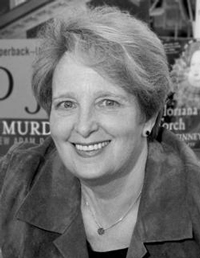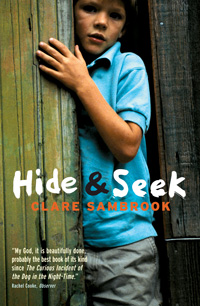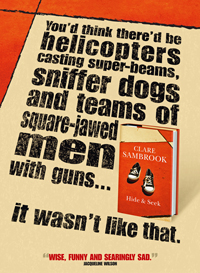Hide & Seek: a reader’s guide
Questions for book groups and students
By Susan Avery
1. Who is Harry? What is important to him? What are his major concerns before Daniel disappears? Do his interests (being with the “cool” kids, fascination with food and smells, bodily functions, passion for sports, etc) seem like those of a normal 9 year-old? “I took a bite of my ice cream; it didn’t taste nearly as good as it used to” (p. 129). Do you think that Harry seems over protected? How do all his perceptions change after Dan’s disappearance? Do you think Harry is a “normal” kid?
2. As Harry tells of the preparations for his Aunt Joan’s wedding to Otis, what do you recognize in Harry’s feelings toward his brother Daniel? How do they interact with each other and with Mo? How would you characterize these siblings’ relationship?
3. At the end of the first chapter Harry says “I heard Mo tiptoe down the stairs from Dan’s room. She met Pa on the landing. I heard low, teasing voices. They seemed to be wrestling. There was giggling and shushing. It must have been the last night I went to sleep feeling safe” (p. 15). This chapter not only introduces the Pickles family but tells a lot about their character. What do you know about the Pickles domestic life? They seem to have some strong beliefs about raising their children. In what significant way does the family not having a television impact on Harry’s view of the tragedy?
4. What did you learn about how Harry’s mind works during the bus ride to and from Legoland? What kind of a school (“Mandela School. A Safe and Happy Place to Learn.” p. 62) do Harry and Daniel attend? What did you learn about the other children who attend the school and their relationships with one another and to the authority figures?
5. Who is Biffo? When does Harry first start talking to him? When things get really bad, how does Biffo stand in for all the adults that aren’t paying attention to Harry? Does the fact that Harry can hear Biffo, and mostly takes his advice, make Harry more mature than the average 9 year-old or less? Do you think that the Biffo that Harry talks to is really the same Biffo that Dan talked to?
6. Like many young children, Harry feels guilty about things he has no control over. Lots of things seem to augment rather than diminish that guilt. The first time that Pa takes Harry back to school, Harry is dismayed that they are ignored “Maybe, like some other people, they were having trouble seeing us” (p. 61). At the same time he is numb to kindness, as when My Sissay tries to give him the medal she has just won: “Between us stood an invisible wall made of kryptonite, wide as the school, and high as the sky. On her side kids ran races, won medals. On my side little brothers disappeared.” (p. 64). What are some incidents when Harry is hurt by disingenuous behavior? When is he just feeling left out? “I hated them. I wanted to be one of them.” (p. 91)
8. What does Harry’s friendship with Terry say about Harry’s new state of mind? “ ‘Don’t sound good to me,’ said Biffo. ‘Looks like this joker’s got you just exactly where he wants you’” (p. 98). Harry believes Terry’s lies and comes very close to committing a violent act under his influence. “Terry yelled ‘Pickles! That’s your target! You know the orders. Do him.’ ” (p. 146) Why does Harry stick to him so closely? Would he be friends with him if Dan had not disappeared? What about their “mission” makes Otis so upset when he hears about it (p. 219–222)?
9. Harry loves his Aunt Joan. When he describes the birth of his baby brother, the good thing he remembers is Aunt Joan showing him off at the hospital. Harry adores her husband, Otis. What do Joan and Otis offer that Mo and Pa do not? How are the two couples different? Discuss the times when Otis and Joan step in to save Harry. What would have happened to Harry if they hadn’t been there?
10. What is the significance of Picasso’s painting of Guernica hanging above the Pickles’s table? How does its depiction of death affect Harry? What other significance does it have in this family’s life?
11. In Chapter 11 the rhythm of Harry’s tapping on his video game and the rhythms of Pa and Otis sparring in the garden take precedence. Do Harry’s senses seem more alert? He overhears his parents, “They were having that row again, tighter and sharper” (p. 117). He cannot put it together. “There’s Harry, Mo. We’ve got to pull through. For Harry.’ . . . ‘Harry?’ she said, ‘Harry’s Not Enough’ ” (p.120). How does this affect him? When these rhythms echo in his head what is happening?
12. Why do Pa and Mo separate for a time? How does it affect Harry’s state of mind? Why does he fail to see the signs of Mo’s imminent breakdown? “But you know things are going to get better. I promise you. And soon. She kissed my head. ‘Wish me luck.’ She didn’t say what for” (p. 186). Do you fault anyone for failing to see the signs of her sickness?
13. Harry has some serious questions about the new baby, but he wants to believe in his mother. “It wasn’t right the way Mo called our baby Dan Dan. It wasn’t right the way we kept him as our secret. It wasn’t right—but it was better than before” (p. 198). Discuss Harry’s reactions to the baby.
14. How does the crisis with Mo and the baby start to change the family’s life? How do things start to become clearer? “Through his tears Pa whispered something. . . . It’s the not knowing. The not knowing. The not knowing.’ That’s what he was saying” (p. 233). Why is that an important discovery for Harry? How does the “not knowing” make you feel as a reader?
15. When Harry’s parents go to Scotland and he is left in the care of Otis and Joan what changes? What does Harry learn about himself? About his family?
16. After Harry’s parents see a counsellor, they are able to “acknowledge their loss.” What happens at the ceremony for Daniel at the river? How is Mo and Pa’s relationship to Harry affected? How do things start to improve after that?
17. How does Harry saving Piggy from getting beaten by a bully, bring him a new sensation of closure? What are all the issues (ishoos) he has had to deal with in order to be able to do this? 18. How is Harry feeling about himself at his 10th birthday party? How has his tragedy made him grow? Is he a different boy from his “9 and a bit” self? How is he the same?




